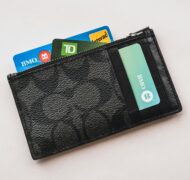Credit Card
Book / Produced by partner of TOW
More than half of North Americans have a credit card in their wallet or purse. It is a handy way to obtain consumer credit for the purchase of goods or services without carrying cash or making payments instantly, especially while traveling. This American innovation became popular in 1938, when oil companies set up a national system to honor one another’s cards for the purchase of gasoline. But it was not until the 1950s, with the development of the computer, that credit cards became almost universal, since this new technology permitted accurate and fast accounting. The debit card, a variation on this, instantly withdraws the money from one’s bank accounts and does not extend the usual thirty-day credit. Credit cards produce profits to the institution granting them by direct user fees, by high interest rates on unpaid balances and through payments from retail establishments, or some combination of these. Many cards now offer further incentives by giving points that can be redeemed for airline travel (see Traveling) and penalizing, so it seems, the use of cash or checks.
As with all forms of credit, the credit card is based on the trust expressed in an individual by a bank or lender. The word credit comes from a Latin root meaning “faith” or “trust.” An individual’s credit rating is a measure of trust placed in him or her by a financial institution. Thus, the process of getting and maintaining a credit card is a form of financial testing, proving that one is a reliable person who will pay his or her bills. As with all forms of credit, this one facilitates the transfer of money in a way that increases its productivity by placing it where it will work. At the same time it economizes on the use of currency.
As with many technological advances, the use of credit cards has changed the way we live and think. We now carry “plastic money.” We can make large purchases quickly without a penny in our pockets or guarantee a hotel room halfway around the world by simply using our number. Instead of providing a large cash deposit to guarantee a car rental, we simply use the line of credit provided with the card.
But there are several disadvantages. It is well known that credit cards make theft and fraud quite simple. The more serious problems are less obvious. We no longer have to wait, for we can buy it now, even if we are not carrying cash. We can “afford” it because we have thirty days to pay, even if we do not have the money in the bank (“It will come!”). It is undeniable that easy credit feeds consumerism and stimulates impulse buying. Many people are tempted to live beyond their means, accumulating debt beyond their ability to repay. Young people in particular are tempted to abuse credit and are filing for bankruptcy in distressing numbers.
So the use of a credit card is in one sense a test of our maturity. Put differently, it is an invitation to grow to an increasing maturity. We can do this by determining not to make purchases unless we actually have the money or a clear and workable plan for repayment of the debt (see Credit; Debt). We can reduce the number of credit cards we have to one or two to resist spreading credit—really debt—over multiple institutions. Further, we can take our credit-card invoices as statements not only of purchases made but values held and carefully reflect on how we should exercise stewardship by preparing a budget and living by it. The last place we should look for help in setting our own credit limit is the institution granting it. Sometimes it is good to fast from credit-card buying, as my wife and I have done, and to use only cash. This gives us a more accurate experience of the flow of money through our hands.
The book of Proverbs speaks to the use of money and credit. It takes wisdom from God to possess money without being possessed by it (Proverbs 1:17-19). Without wisdom we can have wealth but no true friends, food on the table but no fellowship around it, a house but not a home, the ability to buy things but no financial freedom. Without wisdom we will use a credit card to indulge ourselves (Proverbs 21:17) and still never be satisfied (Proverbs 27:20; Proverbs 30:15-16). Credit card in hand, the unwise person “chases fantasies” (Proverbs 28:19) and so comes to ruin, but the wise, accumulating as stewards “little by little” (Proverbs 13:11), “will be richly blessed” (Proverbs 28:20). It takes wisdom to have a credit card and not be possessed by the power in our pockets.
» See also: Consumerism
» See also: Credit
» See also: Debt
» See also: Money
» See also: Shopping
» See also: Shopping Mall
» See also: Stewardship
» See also: Wealth
References and Resources
R. N. Baird, “Credit Card,” in The Encyclopedia Americana (Danbury, Conn.: Grolier, 1989) 8:166-67; J. Barnett, Wealth and Wisdom: A Biblical Perspective on Possessions (Colorado Springs: NavPress, 1987).
—R. Paul Stevens





